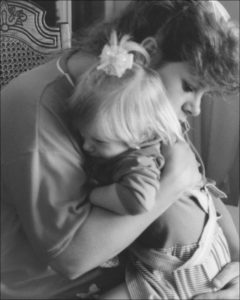For this very reason, make every effort to add to your faith goodness; and to goodness, knowledge; and to knowledge, self-control; and to self-control, perseverance; and to perseverance, godliness; and to godliness, mutual affection; and to mutual affection, love. For if you possess these qualities in increasing measure, they will keep you from being ineffective and unproductive in your knowledge of our Lord Jesus Christ.
2 Peter 1:5-8
The second church I attended was much different from the first. There was no choir filing down the aisle. Hymns were replaced by lively worship songs, led by a group of musicians and singers. The pastor did not preach from a pulpit, but stood at the congregation’s level, sometimes walking back and forth. It was all very casual.
But I came to love it. Especially the sermons. The preaching inspired me, helping me apply the Bible’s teachings to my life. Between that and a ladies’ study group I joined, I grew spiritually. My life with Jesus took on a dimension I had not found in the first church. Jesus became more personal.
I became determined more than ever before to better the lives of people with mental health issues. Especially, I wanted to bring Jesus’ message of love to them as it had been brought to me. Through Jesus I had found healing. Now I wanted to help others find healing.
Eventually I was to discover the joy of writing for people experiencing mental health struggles. The writing ended up forming the major part of my ministry. I have felt God working through me as I write and am so glad he’s using me in this way.
In the year 2006, the pastor gave me approval and support to found a faith-based mental health support group. I was not aware of anything like this happening elsewhere. It took a lot of courage and trust in God to do this. David’s story of slaying Goliath spurred me on.
I found joy in leading my group, as well as trying to help other groups form. Here I introduced Jesus and his healing spirit to members of the group and together we helped each other find ways of coping. I worked with many individuals who needed one-on-one support as well. This continued for nine years, despite ongoing struggles with the symptoms of my disorder. In later years, I found myself in the position of supporting many with mental health challenges, but not getting the support I needed for myself. Eventually, my health would not allow me to continue. I retired from the group in 2015.
At this church, I was treated exceptionally well in my first years there. A couple of people showed me what I saw as godly love. I received a lot of attention from them, perhaps because they saw me as different, special. This kind of caring was new to me, but—having great need—I embraced it. With no counselor to talk to, I started relying on these friends for support, including a lot of sharing of my emotional needs. Eventually, I could not leave them alone, though I tried repeatedly to do so. The relationships broke down, ending in great pain.
Looking back, I can see I needed boundaries. But boundaries would have been most effective if they had been placed closer to the beginning of the relationship. I got attached in a way that I believe might have been avoided. If my friends could only have foreseen what would happen! I’ve written much about this situation—about the hurt that resulted. Those feelings still come back. The memories will not leave.
As I write this today, I believe no one was to blame. Those who hurt me and I as the one who was hurt.
On the part of those who ended up hurting me, I don’t believe they’d had experience with someone like me before. Perhaps little experience at all with a person who has severe mental illness, along with emotional problems. I believe they did the best they knew how.
For myself: I too was blamed, though I did the best I knew how. As a result I was ostracized by members of the church and the memory of the good I’d done was forgotten, as was my good name. I can honestly say I didn’t know what was happening when I got so attached to my friends. It’s only through therapy that I’ve been able to look back and get a better understanding.
This was a horribly painful business. But there’s a silver lining. Through therapy and writing, I’ve learned a lot. I’ve gained wisdom I can now pass along. Perhaps I’ve reached the makings of a resolution.
I pray that my story will help you who are reading this. If you’re a supporter or someone who needs support, try to encourage support for each other, instead of letting the giving go only one way. It would be so much healthier if each of you can be in a supportive role as much as possible. Giving and receiving in whatever ways you can. Like a brother and a sister, rather than a father or mother. I believe there would be less danger for the person you support to rely on you.
We need a brother or a sister to walk alongside. Not a father or mother to hold us.
This has been part 13 of my series My Journey from Patient to Leader. Read Part 14 Better than Wisdom

Leave a Reply